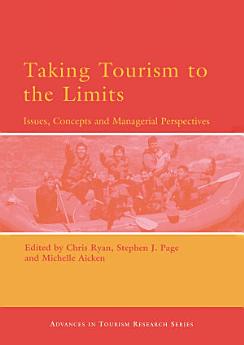Taking Tourism to the Limits
Michelle Aicken · Stephen J. Page · Chris Ryan
আগ ২০০৬ · Routledge
ইবুক
326
পৃষ্ঠা
family_home
যোগ্য
info
reportমূল্যাংকন আৰু পৰ্যালোচনা সত্যাপন কৰা হোৱা নাই অধিক জানক
এই ইবুকখনৰ বিষয়ে
The concept of margins and limits is often referred to within the tourism academic literature and includes subjects as diverse as carrying capacities, peripheral economies, technological advancement, adventure tourism, dark tourism and socially marginalized communities. After identifying a number of ways in which ‘limits’ might be defined Taking Tourism to the Limits explores concepts and challenges facing contemporary tourism in five main sections, namely in tourism planning and management, nature based tourism, dark tourism, adventure and sport tourism and the accommodation industry. Drawing upon case studies, current research and conceptualizations these different facets of the ‘limits’ are each introduced by the editors with commentaries that seek to identify themes and current practice and thinking in the respective domains. The picture that emerges is of an industry that reinvents itself in response to changing market parameters even while core issues of stakeholder equities and political processes remain problematic. International in scale, the book links with its companion piece Indigenous Tourism – the commodification and management of culture (also published by Elsevier) as an outcome of the very highly successful conference, Taking Tourism to the Limits hosted by the University of Waikato’ Department of Tourism Management in 2003.
লিখকৰ বিষয়ে
Ryan Chris, Page Stephen J., Aicken Michelle
এই ইবুকখনক মূল্যাংকন কৰক
আমাক আপোনাৰ মতামত জনাওক।
পঢ়াৰ নির্দেশাৱলী
স্মাৰ্টফ’ন আৰু টেবলেট
Android আৰু iPad/iPhoneৰ বাবে Google Play Books এপটো ইনষ্টল কৰক। ই স্বয়ংক্রিয়ভাৱে আপোনাৰ একাউণ্টৰ সৈতে ছিংক হয় আৰু আপুনি য'তে নাথাকক ত'তেই কোনো অডিঅ'বুক অনলাইন বা অফলাইনত শুনিবলৈ সুবিধা দিয়ে।
লেপটপ আৰু কম্পিউটাৰ
আপুনি কম্পিউটাৰৰ ৱেব ব্রাউজাৰ ব্যৱহাৰ কৰি Google Playত কিনা অডিঅ'বুকসমূহ শুনিব পাৰে।
ই-ৰীডাৰ আৰু অন্য ডিভাইচ
Kobo eReadersৰ দৰে ই-চিয়াঁহীৰ ডিভাইচসমূহত পঢ়িবলৈ, আপুনি এটা ফাইল ডাউনল’ড কৰি সেইটো আপোনাৰ ডিভাইচলৈ স্থানান্তৰণ কৰিব লাগিব। সমৰ্থিত ই-ৰিডাৰলৈ ফাইলটো কেনেকৈ স্থানান্তৰ কৰিব জানিবলৈ সহায় কেন্দ্ৰত থকা সবিশেষ নিৰ্দেশাৱলী চাওক।






